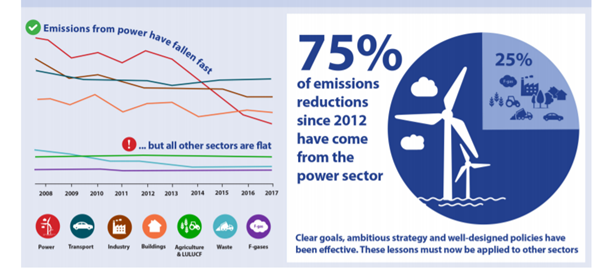

The CIHT’s Transport Sector Decarbonisation Pathway project is setting out to engage as widely as possible across all parts of the sector to develop a consensus on the practical, deliverable steps to get the whole sector on the path to net zero – and CIHT’s role in making it happen.
Join other savvy professionals just like you at CIHT. We are committed to fulfilling your professional development needs throughout your career
If I asked you what does Net-Zero mean for you professionally, how would you reply?
If the answer is well, to be honest, not much I think you should be worried. The UK’s commitment to reach net zero greenhouse gas emissions by 2050 is a binding legal commitment and is increasingly front and centre in the strategic plans of the Department for Transport, Highways England and their counterparts across the UK. At the local level more than three quarters of Councils have declared a climate emergency and are asking their partners to demonstrate how they are bearing down on their emissions.
I’m guessing that given just how important Net Zero has become in the last couple of years it is much more likely that your response to my question will depend on you and your organisation’s role. If you are sitting in a contractors office reading this blog, you are probably wrestling with how to transition your vehicles and plant and perhaps wondering when the technology you think you’ll need will be commercially available. You might be looking at new materials or trying to work out the carbon impact of adopting modular construction. If your role is in sustainable mobility, you’ll be thinking about how to square the impact of COVID-19 on travel behaviour with the government’s goal of reducing car and van movements by 3 and 9% respectively by 2035 – and making this all fit to wider placemaking and quality of life goals. Engineers the country over are thinking about the planning and logistical challenge of rolling out the charging infrastructure (and the knock on impact on the grid) to support the enormous increase in the number of electric and hydrogen vehicles that will be on our roads by the end of this decade.
This is all happening in the profession because as the CIHT Climate Pledge notes the Committee on Climate Change has highlighted the areas where change is required. These areas are all where CIHT members are active and influential and include travel, energy consumption, building techniques and technology
Put more starkly we are now the front line of the decarbonization challenge. When the UK adopted the Net Zero target in 2019, the vast majority of the emission reductions the UK had achieved in the previous decade had come from the power sector. That progress means that transport and industry are now the 2 biggest single sources of emissions – and progress has been very slow.

Source: Committee on Climate Change – 2018 Progress Report to Parliament
What needs to happen? As the CCC said back in 2018 we need clear goals. The different objectives being pursued in different parts of the transport sector are not (I think) in conflict but how do they fit together and interact? What actions will have the greatest impact on transport decarbonization, in what order do they need to be done? Do we have the knowledge, technology, data, people, business processes, policy framework we need. Are all these moving parts aligned? What is really holding us back? And what existing strengths do we have we can lever off?
The CIHT’s Transport Sector Decarbonisation Pathway project is setting out to tackle these questions. Over the next 6 months we will be engaging as widely as possible across all parts of the sector to develop a consensus on the practical, deliverable steps to get the whole sector on the path to net zero – and CIHT’s role in making it happen.
I’m absolutely delighted that Baroness Brown of Cambridge, former Deputy Chair of the Committee on Climate Change (and contributor to the Future of Our Climate Day at CIHT Spring Conference) has agreed to Chair the project advisory group. I’m looking forward to getting down to work with the Advisory Group, CIHT members and strategic partners so that the pathway will be available in advance of the United Nations COP26 Climate Conference hosted by the UK in Glasgow in November.
In my next blog, I’ll explain more about the consultation process but in the meantime if you’d like to be involved or just share your views do contact me at Andrew.crudgington@ciht.org.uk
Andrew Crudgington is acting Climate Change Associate at CIHT. Previously he was Director of External Affairs & Strategy at the Institution of Civil Engineers where he was responsible for ICE's policy advice to government and other stakeholders.
In recent years he has delivered policy and industry improvement projects for a range of organisations including the Association for Consultancy and Engineering, and the Major Projects Association.

Join other savvy professionals just like you at CIHT. We are committed to fulfilling your professional development needs throughout your career
{{item.AuthorName}} {{item.AuthorName}} says on {{item.DateFormattedString}}: